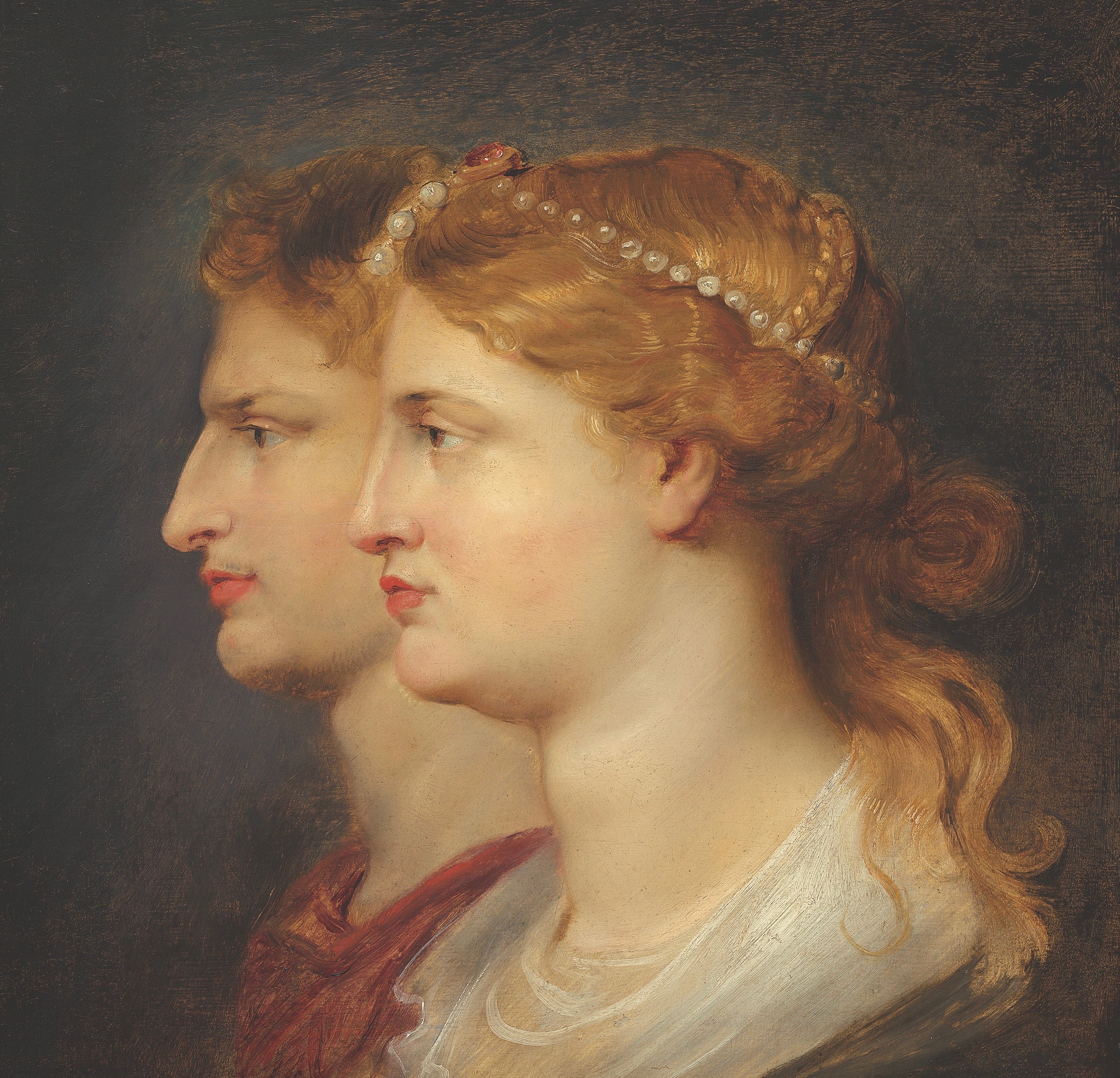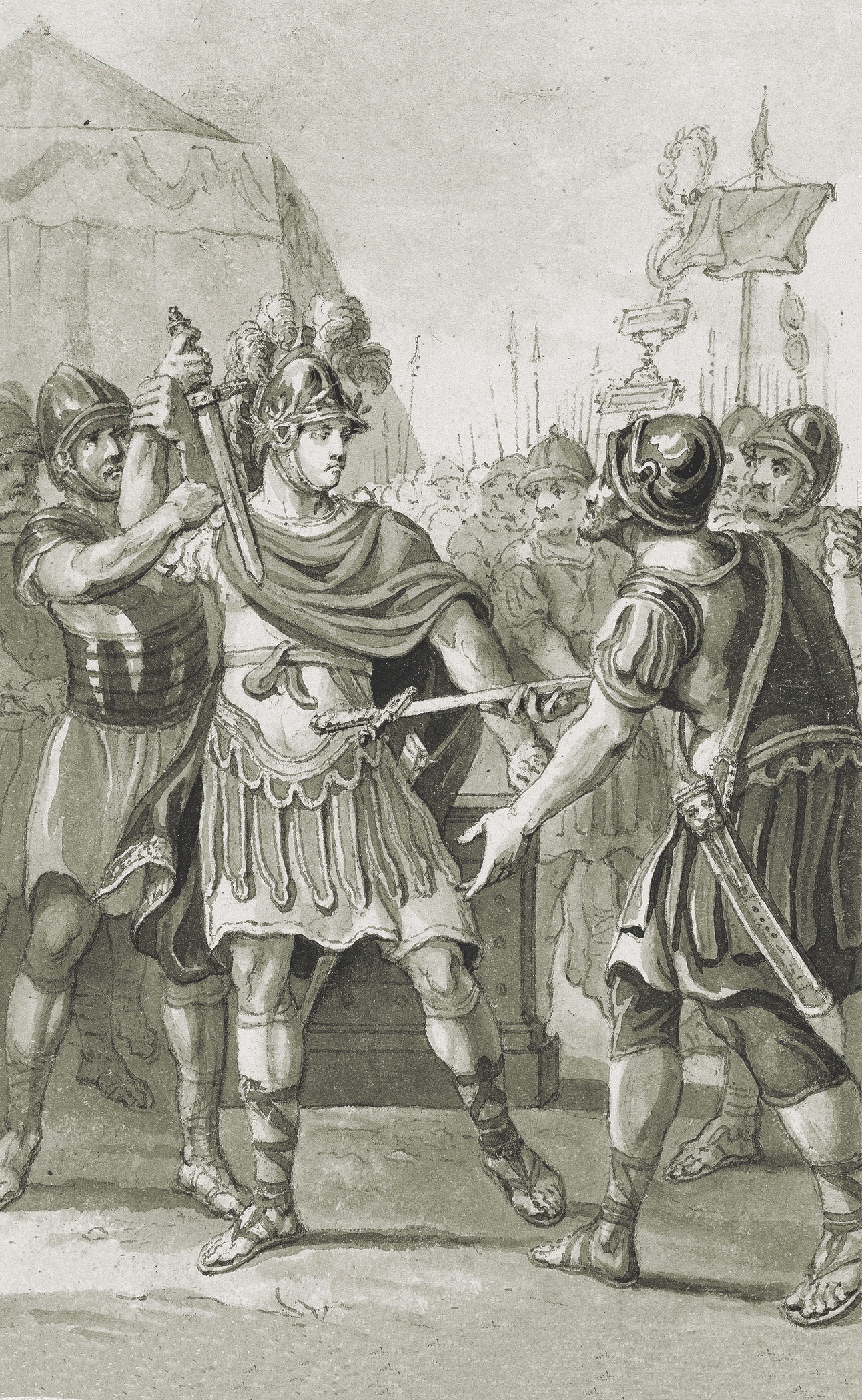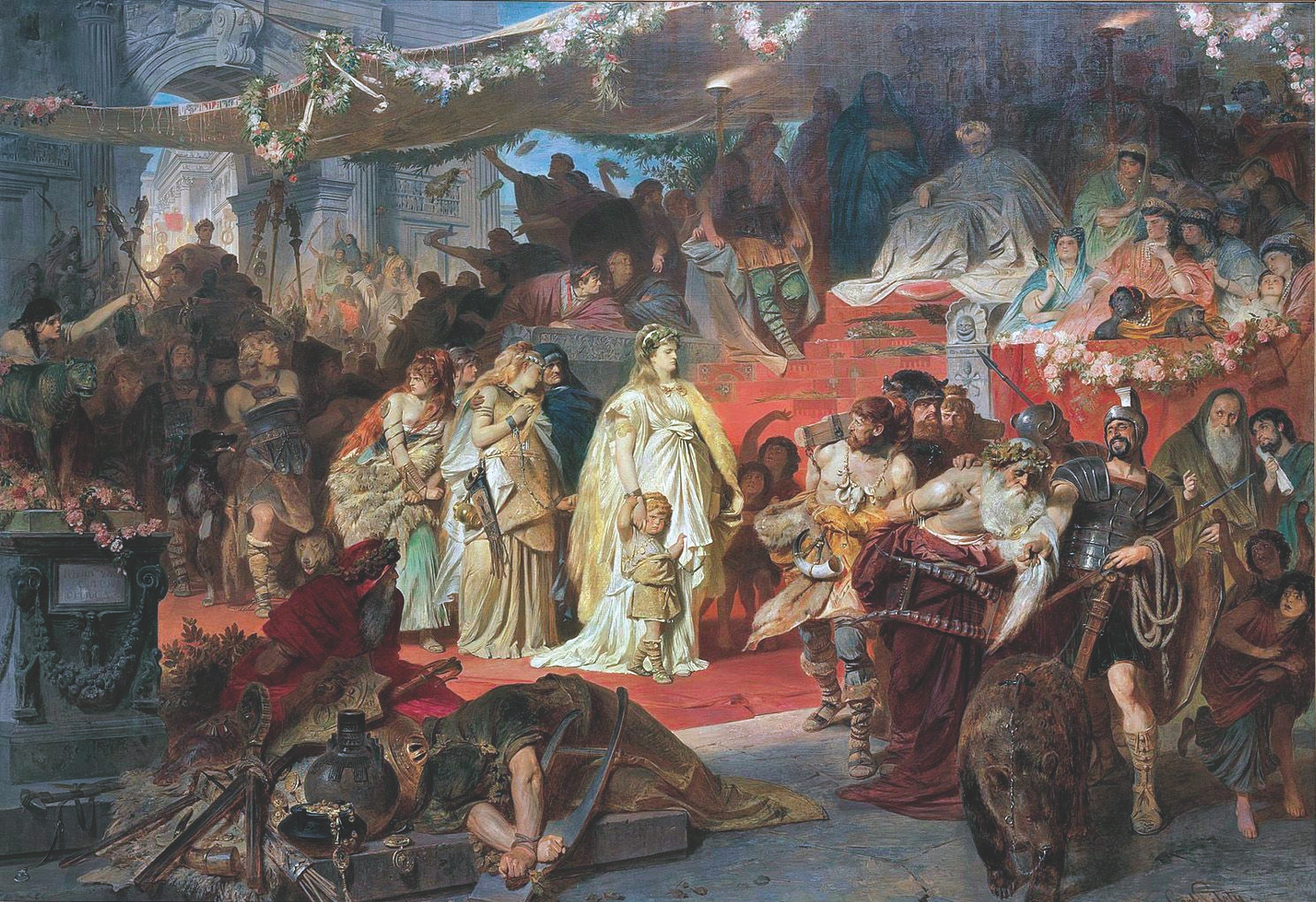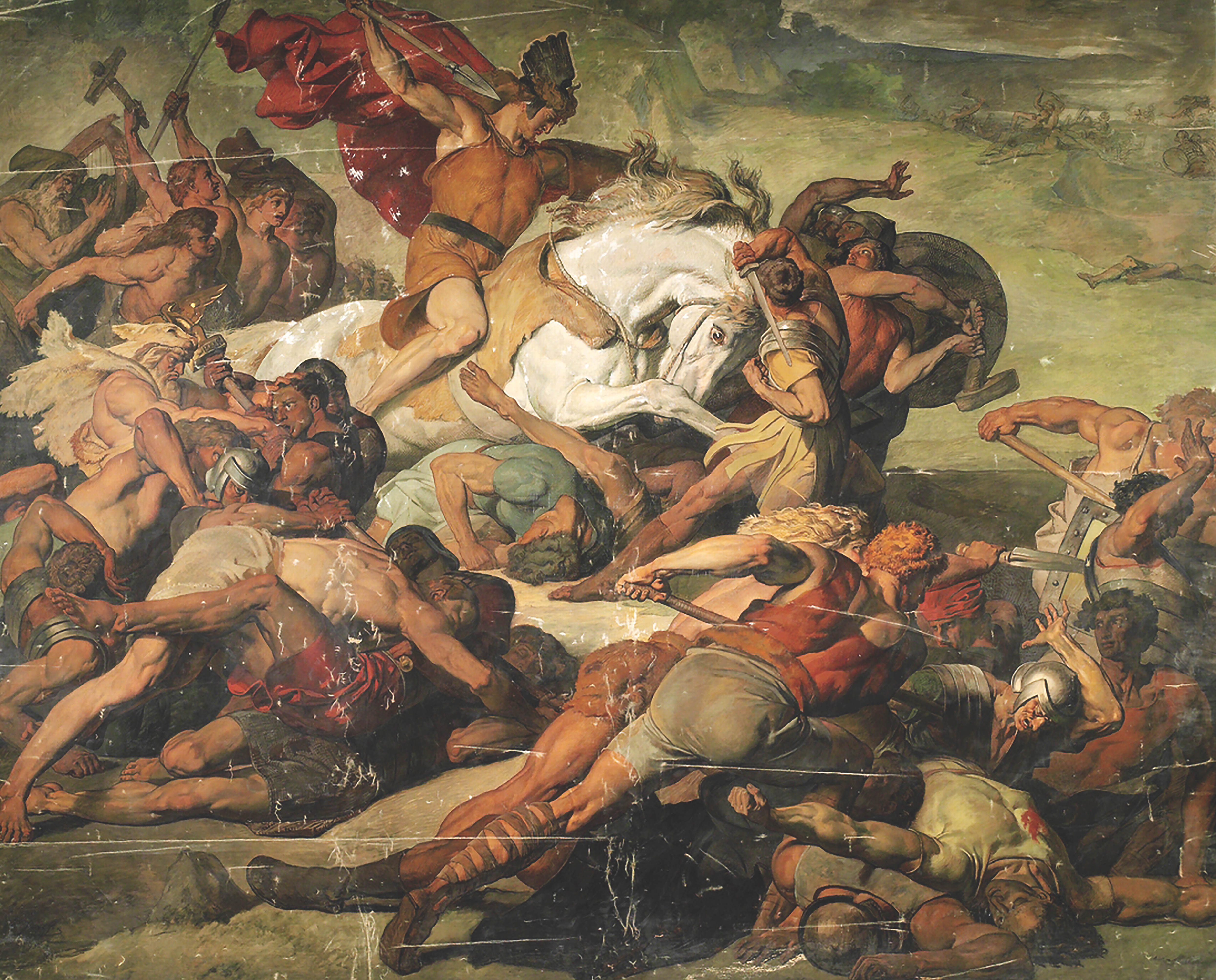What now? Germanicus Julius Caesar, governor of Tres Galliae and Germania, might have wondered such as he opened the dispatch. It was mid-September in ad 14. A month earlier he’d received in similar fashion the dark and momentous news that Imperator Caesar Divi filius Augustus, first man of the Roman empire, was dead. The same dispatch communicated that Tiberius, Germanicus’ uncle, had assumed the throne. That came as no surprise, for while Augustus had not legally designated Tiberius as his political successor, he had adopted him as a son and given him a share of imperial power and responsibility. To maintain political stability Augustus had also required Tiberius to adopt Germanicus, whose father had died, as his eldest son and heir. Put plainly, the earlier dispatch from Rome had informed Germanicus he stood next in line to the most powerful leader in the Western world.
Since then little had changed in the northern provinces. Germanicus retained his posts under Tiberius, who followed Augustus’ final instructions to maintain rather than seek to expand the frontiers. In addition to his administrative responsibilities Germanicus was in overall command of eight legions on the Rhine River. His force was subdivided into two provincial commands—one in Germania Inferior, bordering the North Sea, the other in Germania Superior, bordering the Alps. Across the river was Germania Magna. Laced with rivers and swamps, it was an untamed and unconquered region, whose dark, forbidding forests had swallowed whole legions.
The frontier had been quiet of late, but Germanicus remained watchful for incursions from across the river. He had been in Gallia Belgica, overseeing the completion of a census to assess property taxes, when he received the second dispatch from Rome. He likely worried it carried news the Germanic tribes had risen and were threatening an invasion. But the news was even worse: The Roman army of the Rhine had mutinied.

When Germanicus became governor in ad 13, the Rhine marked the boundary of Roman territorial ambitions in the north. But it had not always been that way.
Nearly seven decades earlier Julius Caesar had been the first Roman commander to cross the Rhine under arms, as a show of force to deter Germanic raids into Gaul. For the past quarter-century Augustus had spent much blood and treasure trying to subdue Germania and stabilize the frontiers, employing Tiberius and his younger brother, Drusus, as field commanders. Beginning in 12 bc Drusus had systematically subdued Germania Magna in a series of annual campaigns, pushing Roman control to the Elbe River in four years. At the completion of that campaign in 9 bc he died from injuries suffered after a bad fall from a horse. As a posthumous battle honor the Senate awarded Drusus the hereditary agnomen Germanicus (“German”), a name evocative of his military achievements in the region. The weighty legacy it bore passed to his then 6-year-old son.
As a young man Germanicus would prove worthy of the title, rapidly climbing the political ladder and securing military honors for helping Tiberius quell an uprising in Illyricum. As Germanicus returned to Rome in ad 9 to receive a triumphal insignia, the 24-year-old no doubt took pride that, as a legacy of his father, the surrender and resettlement of the German tribes had set the stage for the formation of a new province in Germania Magna. Then disaster struck. That September in the Teutoburg Forest of central Germania Magna a tribal coalition ambushed and wiped out three legions and their auxiliary cohorts under provincial governor Publius Quinctilius Varus. A cornered Varus had fallen on his own sword.
Tiberius immediately set off to assume command, taking Germanicus and some recently demobilized Balkan detachments with him. Even with forced marches it took weeks to reach the virtually unmanned fortresses on the Rhine. Only two reserve legions remained to hold the line. After establishing guard details to intercept any Germans trying to cross the river and leaving Germanicus in command, Tiberius returned to Rome to consult with Augustus. On arrival he found Rome full of foreboding. A fear of barbarians gripped the city. Augustus had expelled the resident Gauls and Germans from Rome, including his own personal bodyguard, the Germani corporis custodes, and those serving with the Praetorian cohorts. Forced conscriptions had raised new units to be sent north to defend Italy. While the populace feared a Germanic invasion, none came. The frontier posts held. But the “Varus disaster” effectively ended Roman hopes of conquest in Germania Magna and reset the frontier along the Rhine.
But Rome did not regard the river as an impassible barrier. In ad 11 Tiberius and Germanicus crossed into Germania and overran portions of it. Their “invasion” was more of a demonstration than a serious attempt at reoccupation, however. Fearing another ambush and disaster, they did not venture very far, nor did they fight any battles. After making the point they could still enter the region and march about at will, the Romans went home.
After a term as consul, Germanicus was appointed governor of the Gallic provinces and what was left of Germania. The post was a complex one, centered on encouraging the economic and political development of Gaul by promoting regional capitals; supervising trade, taxation and army contracts; and ensuring the security of the mint in Colonia Copia (present-day Lyon), which struck the coins that supported markets in trade goods and paid the army. Germanicus also remained wary of the threat of invasion. To that end he commanded eight legions—representing a full third of the empire’s legionary manpower—consisting of I Germanica, II Augusta, V Alaudae, XIII Gemina, XIV Gemina, XVI Gallica, XX Valeria Victrix and XXI Rapax, in addition to auxiliary cohorts.
Life in the Roman legions was not easy. Beyond open battle with the enemy, it entailed long marches with heavy packs, drill, guard duty, patrols, equipment maintenance, construction of camps, fortifications, roads and bridges, and many other duties and labors—all the while subject to strict military discipline. Mutiny had occurred often enough, but several features of the mutiny with which Germanicus dealt merit special mention.

First, it was not isolated. Weeks prior the troops in Pannonia had mutinied and for many of the same reasons. They had attempted to kill their commander, Junius Blaesus, and threatened to march on Rome if their demands were not met. That crisis was dispelled through diplomacy with relatively little violence. The mutiny in Germania would see far more bloodshed. Second, the nature of the demands made were driven, in large part, by disappointed hopes and failed promises. Third, as in Pannonia, the mutiny coincided with the death of Augustus and shift of power to Tiberius, the disaffected legions believing it the moment of greatest opportunity.
The account given by historian Cassius Dio (c. 155–235) of the Pannonian mutiny is succinct in its description of the mutineers’ grievances: “Their demands were, in brief, that their term of service should be limited to 16 years, that they should be paid a denarius per day, and that they should receive their prizes then and there in the camp; and they threatened, in case they did not obtain these demands, to cause the province to revolt and then to march upon Rome.” Germanicus would confront similar demands in Germania. They were neither localized nor improvised. In fact, their roots stretched back to the very beginning of the reign of Augustus.
Following his decisive victory at the 31 bc Battle of Actium and the close of the last civil war of the Roman republic, Augustus had reorganized the army, reducing the number of legions from 60 to 28 and dismissing 300,000 men from active service. Such a massive force had been expensive and inefficient, and he instituted reforms to professionalize the army and make it less menacing to the political stability of Rome.
The late republic had been plagued by the challenge of client armies, whose loyalty was to individual generals rather than to the Senate or Rome. Such armies had been wielded against rivals and to intimidate the Senate into granting their commanders political power. To combat these dangers, army salaries would now be paid directly by the emperor, ensuring loyalty to Augustus rather than to generals. Successful generals had also provided retirement grants of money and land for their veterans. That obligation was taken over by the state to further channel loyalty toward the emperor. Augustus established the right to retire with gratuity after 16 years as a ranker and a further four as a veteran. Retirees were to be paid bonuses drawn from a special treasury, aerarium militare, established to finance these payments and pension plans. In practice, however, many were forced to continue their service despite this reform, shaping the complaints of the mutinies in ad 14.
The two subcommands on the Rhine under Germanicus’ authority were the army of Germania Superior, commanded by Gaius Silius, and that of Germania Inferior, under A. Caecina Severus. Mutiny flared in the legions of the latter, with Legions V Alaudae and XXI Rapax taking the initiative, then bringing I Germanica and XX Valeria Victrix over to their cause. The legions under Silius remained on the sidelines, adopting a wait-and-see attitude. While Caecina stood by helplessly, his troops attacked their company commanders and dumped their broken bodies into the Rhine. On hearing of the outbreak, Germanicus marched directly to the source of the trouble.
On arrival he was met outside the camp by seemingly remorseful men. But when he entered their lines, they assailed him with complaints, some forcing his outstretched hand into their mouths to reveal toothless gums and otherwise displaying the ravages of old age. Germanicus tried to restore order by directing them to form up in their respective units and display their standards. He then spoke reverently of the memory of Augustus, the victories of Tiberius and the tranquility of the empire. These sentiments they received in silence, but when he began to speak of the mutiny, asking what had become military discipline, he was met with a roar of protest. They stripped their tunics to show their scars received in battle and by floggings administered by their own commanders. They complained of scanty pay and strenuous duty. The greatest outcry came from soldiers who had served in 30 or more campaigns. When would they be released from crushing service? Where were the legacies left them by Augustus?

In a final gamble the mutineers sought to bind Germanicus to their cause by appealing to his self-interest: They would make him emperor. As in Pannonia, the legions of Germania sought to exploit the political instability that accompanied a transition of authority. According to the historian Tacitus (c. 56–120), that is precisely what Tiberius most feared—that Germanicus would prefer the possession to the expectation of the empire. But both he and the rebellious legions of the Rhine misjudged their man. Germanicus was loyal to Tiberius and would hear no more. Jumping down from the rostrum, he shouted that death was preferable to disloyalty, dramatically drew his gladius and threatened to plunge it into his own chest. The reaction was mixed. Some soldiers seized his arm to prevent the deed, while others encouraged him to strike, offering him their own sharper swords to aid him. Amid the tumult loyal officers ushered Germanicus into a tent.
What was to be done? Neither rhetorical appeal nor a show of authority had been sufficient to suppress the mutiny. It was known certain agitators were organizing a deputation to sway the army of Germania Superior, and it was rumored the rebels were planning to plunder the Gallic provinces. Further, the Germanic tribes had gotten wind of the mutiny and waited only for the legions to abandon the Rhine to launch an invasion. Yet both severity and leniency carried their attendant dangers. To use auxiliaries against the rebellious regulars would likely prompt civil war. But to give way was to surrender authority in the face of insurrection. Either amounted to a dangerous weakening of the frontier and a threat to the stability of the empire.
In haste Germanicus decided to issue a promise in Tiberius’ name: full discharge for those who had served in at least 20 campaigns; men who had served in 16 or more released from all duties but defense of the frontier; and the legacies to be paid and doubled when the troops had reported to their winter camps. This offer was both less and more than Augustus’ original policy. The troops demanded the discharges be arranged at once, and the two instigating legions, V and XXI, demanded immediate payment of all they were due. By pooling his own traveling funds with those of his staff, Germanicus managed to pay the entire sum. The legions duly withdrew to winter quarters. The immediate crisis past, Germanicus proceeded to Germania Superior. The legions stationed there took an oath of loyalty to Tiberius with relative composure. They had not demanded discharges or payments, though both were conceded.
The trouble in Germania was not over, however. Apprised of the situation, Tiberius had sent a senatorial commission to investigate the matter. Germanicus had since encamped at Ara Ubiorum with Legions I and XX, along with the men who had been discharged but not yet demobilized. Believing the purpose of the deputation was to nullify the concessions they had won, the troops again rioted. Focusing their ire on chief envoy Lucius Munatius Plancus, they would have killed the former consul had he not fled and sought refuge in a tent holding Legion I’s sacrosanct eagles and standards, whose bearer shielded Plancus from further violence. Germanicus managed to extricate the delegates from danger and send them away under the protection of auxiliary cavalry, while he, though a Caesar, remained a virtual prisoner in his own camp.
A combination of spectacle, rhetoric, inducements to shame and repentance brought the mutinous legions back to the path of duty and loyalty. The spectacle involved the departure from the tumultuous camp of Germanicus’ pregnant wife, Agrippina, and toddler son, Gaius, whom the adoring soldiers had nicknamed Caligula (“Little Boot”). A granddaughter of Augustus, Agrippina was strong-willed and had scorned her husband’s suggestion to flee, but Germanicus ultimately persuaded her to take their son and unborn child to safety. As they left amid a tearful entourage without an honor escort to seek refuge with foreigners, Germanicus announced that the guilt of the legions would not find increase in the murder of the great-grandson of Augustus and the daughter-in-law of Tiberius. That was almost too much for the rebels to bear, but Germanicus didn’t stop there, refusing to call them either soldiers or citizens and rhetorically shaming them with allusions to violations of duty, gratitude and honor. He urged them to shake off the contagion of guilt. Their resolve broke. The rank and file begged him to punish the guilty few and forgive those led astray.

A bloodbath of repentance followed, though Germanicus did not lift a hand in it. Of their own accord his men arrested the ringleaders and led them onto a platform. If the crowd shouted, “Guilty!” the accused was thrown down and butchered by his fellows. Germanicus did not intervene, for the crime was expiated in the carnage for which he would not bear the stigma.
But Legions V and XXI, the instigators and greatest offenders of the mutiny, took no part in the display of penance. In winter camp some 60 miles away, they remained defiant. Germanicus resolved to lead troops down the Rhine to compel their loyalty. Seeking to salvage what he could from the situation, he sent a letter to Caecina, saying he was coming in strength, and if by the time he arrived the agitators had not been punished, he would destroy them all. Caecina read the letter privately to those he could trust, and they in turn identified soldiers on whom they could rely. At a fixed hour the cohorts set upon the ringleaders. Seizing weapons, the mutineers fought back, and the blood of both the loyal and guilty soon stained the tents in camp. When Germanicus arrived, he had the bodies cremated, hoping any lingering ill will would also be consumed by the flames.
Germanicus planned one more exercise to mend the torn fidelity of the Rhine legions—they must draw their swords in service of the emperor and turn them on the enemies of Rome. He himself would lead them across the Rhine to shed German blood. Taking 12,000 regular troops, eight cavalry divisions and 26 auxiliary cohorts divided into four columns, Germanicus had them ravage and burn the countryside for 50 miles around, destroying towns, temples and everything that drew breath. While the legions caught their first victims unawares, by the time they began their return march, neighboring tribes had mobilized and occupied the woods flanking their line of march. With the Roman column strung out, and tribesmen haunting the forested defiles, Germanicus must have feared his legions, like those of Varus, might be lost. When the tribesmen launched a determined attack against the Roman rear guard, Germanicus rode to the spot and urged the men of XX Valeria Victrix to turn their disgrace into glory. Their fiery counterattack smashed the Germans, driving them into open country. Meanwhile, the vanguard had emerged from the trees and established a fortified camp. The Germans dispersed, and the rest of the march was without incident.
A short time later the men were again settled in the winter camps. Who knows what thoughts passed through their minds as they stared into the campfires or across the river at the snow-swept forest? Did they speak of the past, or did they let those bad memories swirl away with the dark, flowing water of the Rhine? MH
A frequent contributor to Military History, Justin D. Lyons is an associate professor of history and government at Ohio’s Cedarville University. For further reading he recommends Germanicus: The Magnificent Life and Mysterious Death of Rome’s Most Popular General, by Lindsay Powell; Roman History, by Cassius Dio; The Annals of Imperial Rome, by Tacitus; and Rome at War: Caesar and His Legacy, by Kate Gilliver, Adrian Goldsworthy and Michael Whitby.

